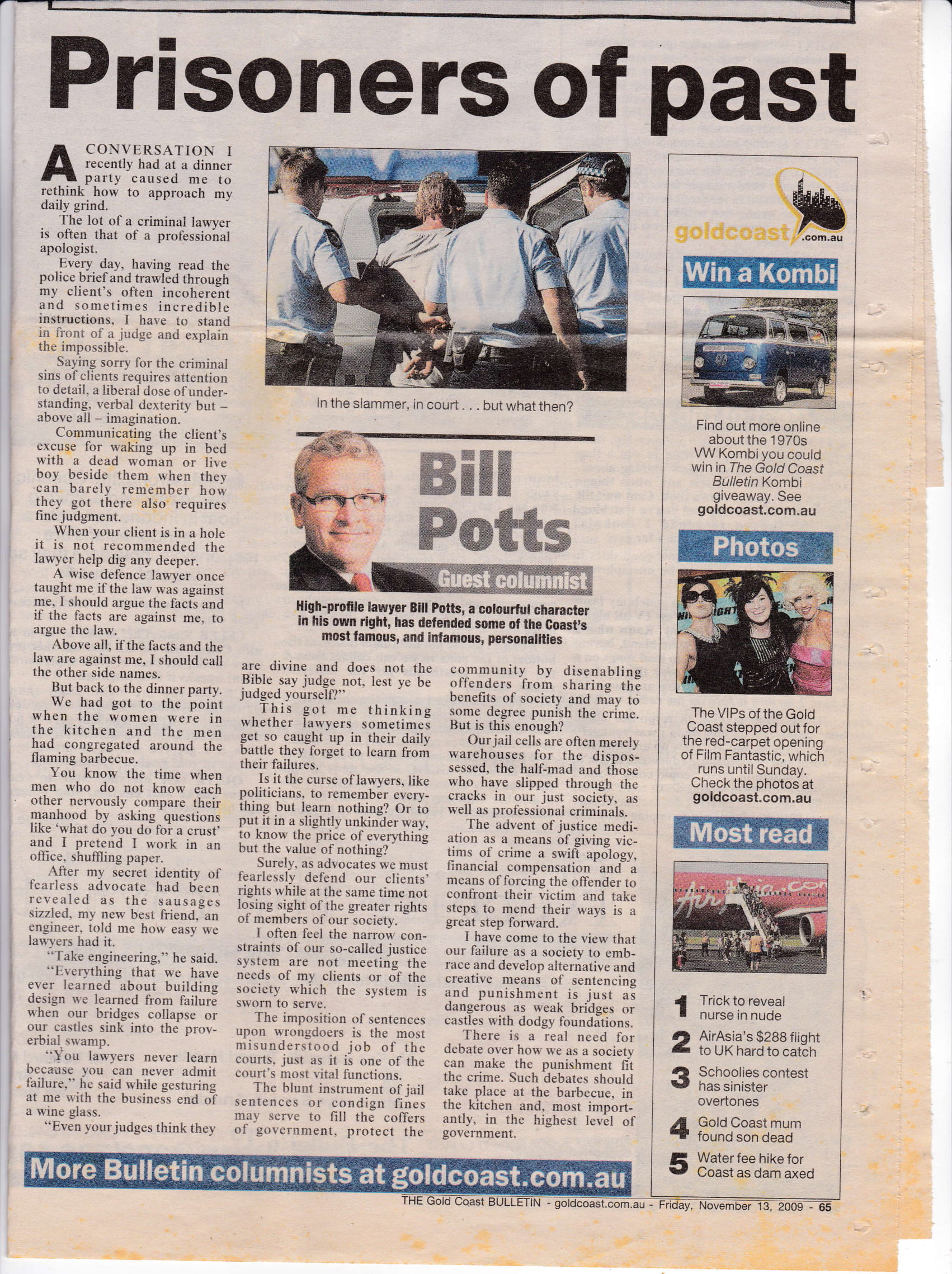We recently discovered this article from our Founding Director, Bill Potts, while trawling through our archives.

Article Transcription
Prisoners of Past – by Bill Potts
A CONVERSATION I recently had at a dinner party caused me to rethink how to approach my daily grind.
The lot of a criminal lawyer is often that of a professional apologist.
Every day, having read the police brief and trawled through my client’s often incoherent and sometimes incredible instructions, I have to stand in front of a judge and explain the impossible.
Saying sorry for the criminal sins of clients requires attention to detail, a liberal dose of under- standing, verbal dexterity but – above all – imagination.
Communicating the client’s excuse for waking up in bed with a dead woman or live boy beside them when they can barely remember how they got there also requires fine judgment.
When your client is in a hole it is not recommended the lawyer help dig any deeper.
A wise defence lawyer once taught me if the law was against me, I should argue the facts and if the facts are against me, to argue the law.
Above all, if the facts and the law are against me, I should call the other side names.
But back to the dinner party. We had got to the point when the women were in the kitchen and the men had congregated around the flaming barbecue.
You know the time when men who do not know each other nervously compare their manhood by asking questions like ‘what do you do for a crust’ and I pretend I work in an office, shuffling paper.
After my secret identity of fearless advocate had been revealed as the sausages sizzled, my new best friend, an engineer, told me how easy we lawyers had it.
“Take engineering,” he said. “Everything that we have ever learned about building design we learned from failure when our bridges collapse or our castles sink into the proverbial swamp.
“You lawyers never learn because you can never admit failure,” he said while gesturing at me with the business end of a wine glass.
“Even your judges in court are divine and does not the bible say, judge lest ye be judged yourself?”
This got me thinking whether lawyers sometimes get so caught up in their daily battle they forget to learn from their failures.
Is it the curse of lawyers, like politicians, to remember everything but learn nothing? Or to put it in a slightly unkinder way, to know the price of everything but the value of nothing?
Surely, as advocates we must fearlessly defend our clients’ rights while at the same time not losing sight of the greater rights of members of our society.
I often feel the narrow con- straints of our so-called justice system are not meeting the needs of my clients or of the society which the system is sworn to serve.
The imposition of sentences upon wrongdoers is the most misunderstood job of the courts, just as it is one of the court’s most vital functions.
The blunt instrument of jail sentences or condign fines may serve to fill the coffers of government, protect the community by disenabling offenders from sharing the benefits of society and may to some degree punish the crime. But is this enough?
Our jail cells are often merely warehouses for the dispos- sessed, the half-mad and those who have slipped through the cracks in our just society, as well as professional criminals.
The advent of justice medi- ation as a means of giving vic- tims of crime a swift apology, financial compensation and a means of forcing the offender to confront their victim and take steps to mend their ways is a great step forward.
I have come to the view that our failure as a society to emb- race and develop alternative and creative means of sentencing and punishment is just as dangerous as weak bridges or castles with dodgy foundations.
There is a real need for debate over how we as a society can make the punishment fit the crime. Such debates should take place at the barbecue, in the kitchen and, most import- antly, in the highest level of government.



